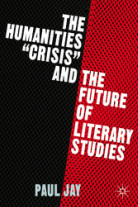"How Not to Defend the Liberal Arts" which appeared in the October 27th edition of Inside Higher Ed, takes issue with recent claims that the liberal arts are dying and that theory and political correctness are to blame. Here are a couple of excerpts:
"If the liberal arts and humanities are in trouble, and in many ways they are, these troubles have little to do with the development of new theories, methodologies, and subject matters. Indeed, such developments ought to be welcome in higher education. Those of us who teach literature, history, religious studies, and the arts are professors, after all, professionals whose work is expected by our colleagues in the natural and social sciences to be theoretically and methodologically rigorous. It's a myth that the sciences have theories and methods and the humanities don't, and it's a mistake to scapegoat theory and professionalization for the current plight of the humanities and liberal arts."
Instead, I argue that those concerned with the plight of the liberal arts need to look instead at the effects the corporatization of higher education are having on the liberal arts and the humanities:
"The corporatization of higher education represents a dramatic shift toward seeing higher education as vocational training, an educational experience geared to credentialing, in which the value of courses and programs are defined narrowly in terms of their practical vocational utility. It's not surprising that these developments have hit the humanities particularly hard, that our disciplines are so vulnerable in an age that increasingly puts the educational emphasis on computational, technological, and mechanical skills at the expense of a broad-based education in history, philosophy, and the arts. If the value of education is increasingly being measured by trustees and legislators too ready to replace a liberal arts model of higher education with a vocational training model of higher education, then it's no wonder the humanities seem to be in crisis."
"If the liberal arts and humanities are in trouble, and in many ways they are, these troubles have little to do with the development of new theories, methodologies, and subject matters. Indeed, such developments ought to be welcome in higher education. Those of us who teach literature, history, religious studies, and the arts are professors, after all, professionals whose work is expected by our colleagues in the natural and social sciences to be theoretically and methodologically rigorous. It's a myth that the sciences have theories and methods and the humanities don't, and it's a mistake to scapegoat theory and professionalization for the current plight of the humanities and liberal arts."
Instead, I argue that those concerned with the plight of the liberal arts need to look instead at the effects the corporatization of higher education are having on the liberal arts and the humanities:
"The corporatization of higher education represents a dramatic shift toward seeing higher education as vocational training, an educational experience geared to credentialing, in which the value of courses and programs are defined narrowly in terms of their practical vocational utility. It's not surprising that these developments have hit the humanities particularly hard, that our disciplines are so vulnerable in an age that increasingly puts the educational emphasis on computational, technological, and mechanical skills at the expense of a broad-based education in history, philosophy, and the arts. If the value of education is increasingly being measured by trustees and legislators too ready to replace a liberal arts model of higher education with a vocational training model of higher education, then it's no wonder the humanities seem to be in crisis."

 RSS Feed
RSS Feed
